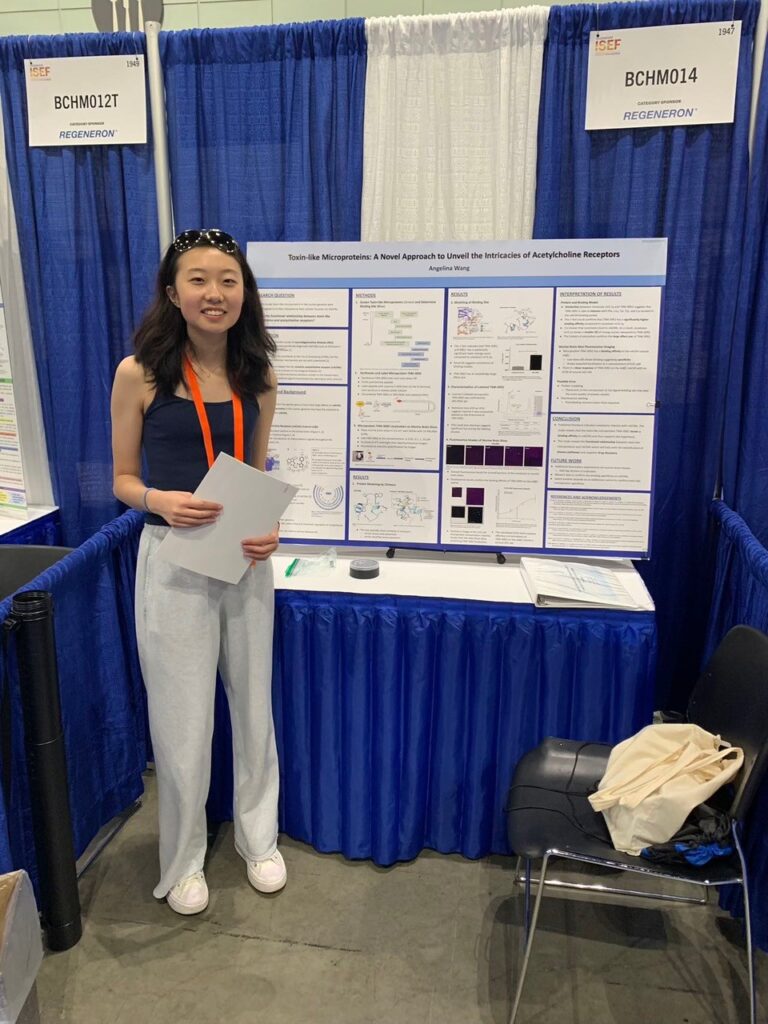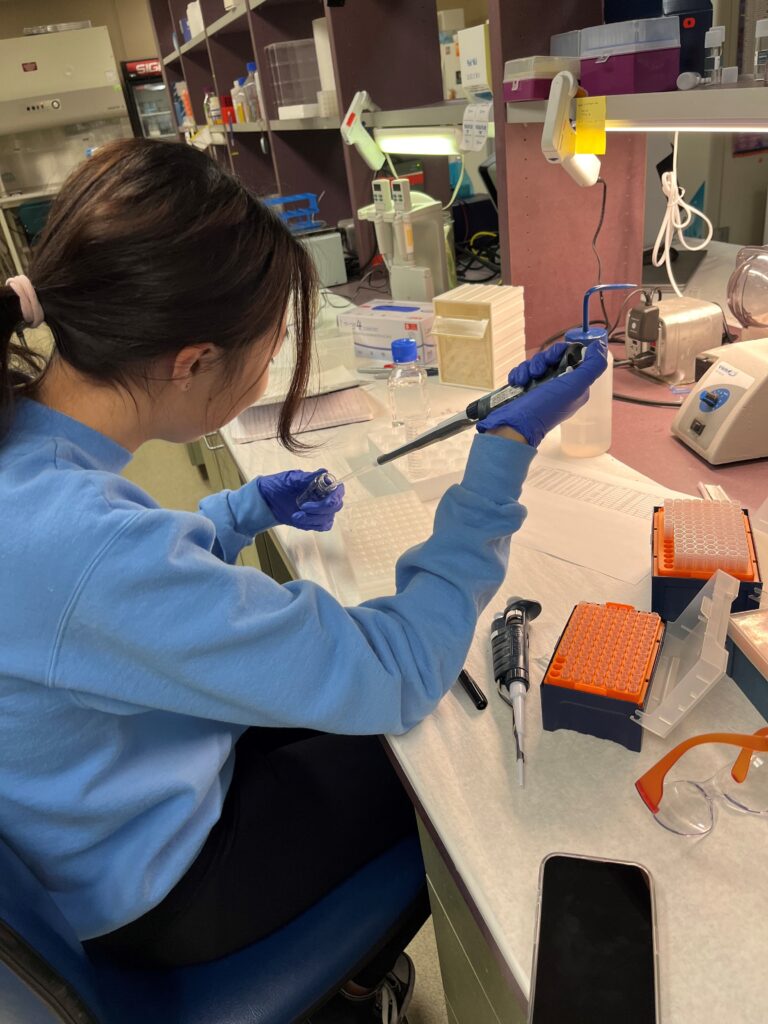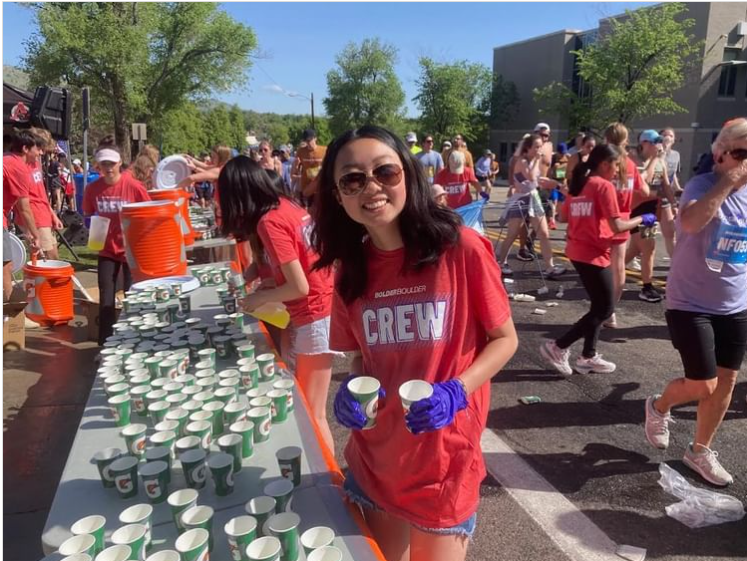The Colorado BioScience Institute (The Institute) proudly celebrates the extraordinary achievements and groundbreaking discoveries made by students in the field of life sciences. Each year, The Institute participates in the Colorado State Science and Engineering Fair at Colorado State University with a panel of distinguished judges. In 2024, we are excited to once again present the Future of Life Sciences Award. This year’s recipient is Angelina Wang, an 11th grader from Fairview High School, for her project “Toxin-like Microproteins: A Novel Approach to Unveil the Intricacies of Acetylcholine Receptors.”
This visionary award honors students who demonstrate exceptional creativity and innovation in their life sciences projects, with a focus on cutting-edge methodologies and their potential impact on the field. With this award, The Institute aims to cultivate a spirit of exploration, and to inspire young minds to push the boundaries of scientific knowledge, contributing to the ever-evolving advancements in life sciences.

This year, hundreds of middle school and high school students showcased their impressive science fair projects at the Colorado State University campus. Our panel of judges eagerly engaged with these talented young scientists. We extend our thanks to this year’s special award judges, Ravi Narayanan from Nordson Medical and Trevor Skaar from Tolmar, for their dedication to nurturing scientific talent and fostering innovation.
Our 2024 winner, Angelina Wang, has always been fascinated by the causes of various diseases and why they develop. In elementary school, she was particularly interested in exploring the causes of cancer. Over time, her passion shifted to neuroscience, where she found it intriguing to study the development of neurodegenerative diseases like Alzheimer’s and Parkinson’s, especially given how much there is still to learn.
Over 50 million people worldwide are diagnosed with neurodegenerative diseases, but the basic causes of these diseases are not well understood. Learning more about these causes is crucial for discovering how the diseases work and finding new treatments. Research shows that conotoxins, a type of toxin, can interact with nicotinic acetylcholine receptors (nAChRs), which help send signals through the nervous system. Angelina’s project aimed to study small proteins similar to conotoxins, found in short open reading frames RNA in the human genome, to see if they can bind and interact with the nAChR subunit ɑ4β2. Angelina’s project was inspired by her experiences with the impacts neurodegenerative diseases can have on individuals, as well as their families, and she hopes that one day her research might be able to improve outcomes for the lives of these patients.
Like any project, Angelina’s came with challenges. Much of the protein modeling software she needed to use to conduct her research she had to figure out how to work on her own. “Overcoming that obstacle was crucial for me to realize that I can pursue this research independently and navigate the process,” said Angelina.
But, she wasn’t entirely alone thanks to the support of her mentor, University of Colorado-Boulder professor Michael Stowell, who was able to offer Angelina invaluable advice, share his own experiences, and help her build confidence.
“Working with Angelina has been a truly enriching experience. My favorite thing about working with her was her unwavering enthusiasm and passion for the project and ability to work independently,” Stowell said.
In addition to her mentor, Angelina credits her school, Fairview High School, for helping her along the way. “They not only connected me with Michael at CU, but also helped me navigate the science fair process, create my poster, and prepare my presentation,” Angelina said.

Angelina’s ultimate aspiration is to continue her research not only through her senior year of high school but also beyond. To her, this project represents just the beginning, with much still to explore. She was astonished to find that the protein she had synthesized could bind to a part of the brain, though she has yet to identify the specific receptor. Her next goal is to pinpoint this receptor and investigate how its interaction might affect the nervous system.
With an estimated 1.2 million people in the U.S. expected to be living with Parkinson’s by 2030 and 13 million with Alzheimer’s by 2050, research like Angelina’s could help change this narrative. The Institute is excited to recognize the future talent in our state and looks forward to seeing what students like Angelina will contribute to the life sciences ecosystem in the years to come.

Photo credit: Fairview Science Teacher, Dr. Paul Strode
As we celebrate Angelina’s remarkable accomplishments and those of all the students at the Colorado State Science and Engineering Fair, we also recognize the vital role of a supportive network and community guidance. The Future of Life Sciences Award is a testament to the collective dedication of the Colorado BioScience Institute and Colorado’s life sciences community. This award reflects our commitment to nurturing and diversifying the state’s life sciences workforce, from the classroom to campus and into professional careers.